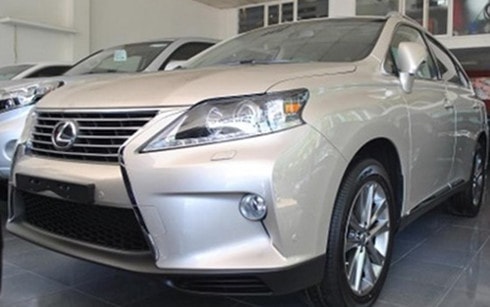Luxury cars are about to 'bear' additional environmental protection fees?
The Ministry of Finance has just proposed collecting environmental protection fees for luxury cars with a capacity of over 3 liters.
The Ministry of Finance has just sent a document to the Ministry of Natural Resources and Environment and the Ministry of Transport regarding the development of a project to collect environmental protection fees for luxury cars with an engine capacity of over 3 liters.
 |
| The special consumption tax on cars has also been amended to increase the tax rate on cars with high cylinder capacity. |
The Ministry of Finance said that according to the Prime Minister's decision, the Ministry of Finance was assigned to preside over, research, and issue environmental fees in the direction of increasing for vehicles with cylinder capacity over 3 liters because these are fuel-consuming vehicles, large in size, not suitable for traffic infrastructure conditions and people's income, and have large emissions into the environment.
According to regulations, environmental protection fees for gas emissions are under the Government's regulatory authority. Therefore, the Ministry of Finance requests the Ministry of Natural Resources and Environment and the Ministry of Transport to study and propose to submit to competent authorities to regulate environmental protection fees for gas emissions in accordance with socio-economic conditions.
If the draft is completed and approved, the new regulation is expected to take effect from early 2017.
In the middle of last year, the environmental protection tax on gasoline increased by 300% compared to the previous level. Specifically, the tax on gasoline increased from 1,000 VND to 3,000 VND/liter, and diesel increased by 500 VND to 1,500 VND/liter from May 1, 2015.
Previously, the special consumption tax on cars was also amended to increase the tax rate on cars with high cylinder capacity. Specifically, from July 1, 2016, cars with capacity under 1.5 liters will have their tax reduced from 40% to 35% and cars with capacity from 1.5 - 2 liters will have their tax reduced from 45% to 40%.
On the contrary, the tax on large-capacity vehicles will increase sharply compared to the current tax rate. In particular, for vehicles with a capacity of over 2.5-3 liters, the tax will increase from 50% to 55%. Vehicles with a capacity of over 3 liters will increase by a record high of 60% compared to the current rate, which is divided into the following lines: 3-4 liters 90%, 5-6 liters 130%, and vehicles with a tax rate of over 6 liters 150%.
In addition, from January 1, 2016, imported cars will be subject to another direct adjustment related to special consumption tax. Accordingly, the method of calculating special consumption tax on imported cars will change from the calculation based on CIF price plus import tax to the calculation based on wholesale price.
That means, the special consumption tax on imported cars from next year will be calculated on both the CIF price, import tax and some other costs of businesses such as transportation, warehousing, marketing and advertising costs, and even a part of the importer's profit.
In addition, regarding the tax policy for automobiles, in this document, the Ministry of Finance also said that the preferential import tax rate for automobiles as currently regulated has contributed to limiting automobile imports and promoting domestic assembly and production of priority vehicle types for development.
Therefore, the Ministry of Finance plans to continue implementing the current MFN import tax policy on completely built-up cars, except for cases of annual reductions according to WTO commitments./.
According to VOV
| RELATED NEWS |
|---|


